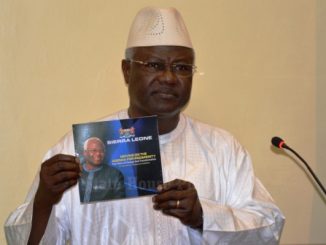
Author: Alhassan Fouard Kanu
Public Health Scholar-Practitioner; Doctor of Public Health (DrPH) Candidate
In a world of so many intricacies, where most of the things we see are sometimes effects or symptoms of something else, in a world where we are required to have ‘facts’, and back up our arguments with sources, it’s always an uphill task to state, with confidence, that X is the cause of Y. Whenever we are about to make an argument, we are habitually reminded that in most cases, the mental and physical space we occupy as we make our arguments, may only be a tiny spot in an intellectual interstellar space we may be unaware of, and that our views are only a product of where we stand; perspective or vintage point.
Where we stand, consciously or unconsciously, influences what things we see and/or how we see them. Consequently, at all times, we are reminded to always caveat everything we say: separating opinion from empirical facts, and constantly acknowledge the limits of our knowledge or views. Precisely put, there is no last word on anything.
Therefore, what I am about to state is my opinion of what, I believe, partly explains the problem why many children, especially of the “HAVE-NOTS” from rural areas are failing. There are many other problems and causes of the problem or symptom I wish to discuss, but for this discussion, I wish to focus on a small strand of this complex issue.
Children of the “HAVES’ i.e. elite (wealthy) politicians and some civil servants mastered English Language as early as 4-6 years. This is inherently because, in the homes of such elites, English is the language of communications (most of the time). These children are more confortable speaking English than their ‘mother tongue’. In my view, this is sad, because this robs the children of wealth of information, knowledge and richness of our native languages. However, in a rigged system like the society we leave in, this problem is an opportunity for the children of the elite politicians and civil servants. In a society where English has, unfortunately, appropriated itself a higher status over our languages, in the functioning of our society, so much so that it’s the medium of instruction in schools, the children of the elites stand a very high chance to perform better than their peers from rural communities where, children grow up speaking their mother tongue and then when they start school, they are introduced to subject content in an alien language.
The children of the elites may be five steps ahead of their peers in a rural setting where most communities are less multicultural, and therefore the native language is used as the medium of communication, both within the home and the community. The elitists’ children readiness for school is far higher than many of their peers with whom they join primary school in the same year. They have mastered a couple of things at an early stage. While many of their peers will be meeting these words for the first time, and only at school, the children of the elites will be a step ahead. The social differences (between urban and rural communities) are what accounts for the social polarization of our society and elsewhere. The elitists’ children use of English at home either by their parents, guardians, siblings or media which they are constantly exposed to, like TVs, games, or books, common in urban homes, most of which use English gives them leverage over their peers in rural areas.
Children in rural areas are rarely prepared to start primary school. Few of them have access to kindergarten or nursery school where they be readied for start of school. English is spoken at school. Immediately they move out of the school, literally, the learning stops. There is a short circuit in the learning process since the link between school, community (where they pass while coming from school) and home is punctuated.
Ideally, children should be able to share with their parents what they are learning and be supported. In rural homes, where many parents cannot read and write in English, it is extremely hard to continue this learning process. They are closed off from helping the teachers because of the language. In an ideal environment, learning should be a continuous process, where teachers build on what children know, and where children can relate what they are learning to what they see in the community, or at home.
In some rural areas, many children do not see the need to study. They have parents who have not studied; some parents even socialize their children into copying with poverty and illiteracy. These children often hear their parents telling others “we did not go to school, are we not surviving?”. These attitudes within some parents precipitate the loss of interesting school within learners, since they come to feel comfortable with not getting an education.
I would argue that acquisition of knowledge is like trying to enter a locked house: one must have the key to the house first. You cannot understand the content if you do not understand the language. First, you have to master the language, and then you interact with the content in a more friendly way. Most children are forced to enter the house, without being given the key that unlocks it. We then blame them for not entering the house. We say they dropped out, when we did not give them the keys to enter the house of knowledge as it is currently constructed. Knowledge has sadly, been locked in one language (i.e. English) so much so that many of those who do not know English are considered useless.
The social polarization notion posits that, the rich becomes richer, and the poor become poorer in societies plagued with social inequities like educational attainment. The poor foundation of early education among children from the poor and rural families means the majority will remain poorer whilst children of the elitist politicians and wealthy civil servants and business individuals will exceptionally achieve educationally. Their children will come back to lead/rule (whether as politicians and top civil servants or wealthy private business persons) the children of the poor; and consequently further widening the disparities between the rich and poor in society.
System-ready educational policies are critical to increase the odds of educational attainment for all, which resultantly will enable us as a society to narrow the gap between the rich and the poor.



